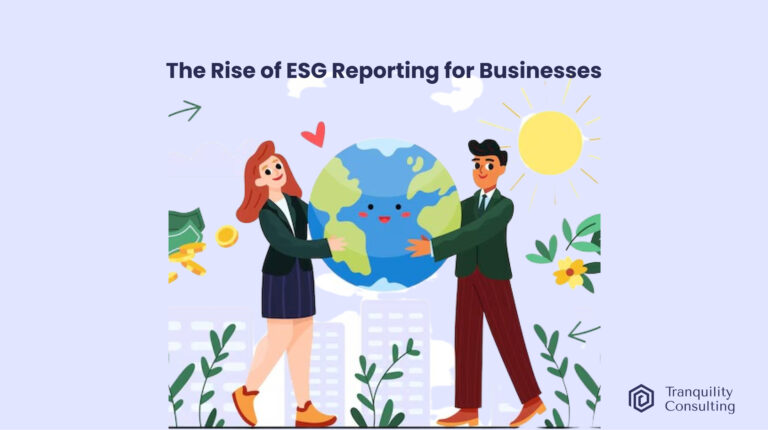As global awareness of climate change, social responsibility, and corporate governance grows, businesses are increasingly expected to demonstrate their commitment to sustainability through Environmental, Social, and Governance (ESG) reporting. Companies are no longer measured solely on financial performance; stakeholders now evaluate businesses based on their management of ESG factors. Integrating sustainability into financial reporting is becoming vital, and this is where Certified Public Accountants (CPAs) play a crucial role. In this blog, we explore ESG reporting requirements and how CPAs can assist businesses in embedding sustainability into their financial statements.
What is ESG Reporting?
ESG reporting involves disclosing data on a company’s environmental, social, and governance practices. It highlights how businesses are addressing risks related to environmental impact, social equity, and corporate governance policies. ESG metrics allow investors, regulators, and customers to assess a company’s sustainability performance and ethical operations.
- Environmental criteria include a company’s policies on energy consumption, greenhouse gas emissions, waste management, and its overall impact on the natural environment.
- Social factors measure a business’s relationships with employees, customers, suppliers, and communities. Key indicators include labor practices, diversity and inclusion, and customer satisfaction.
- Governance focuses on how a company is led, including executive compensation, shareholder rights, audits, and anti-corruption policies.
ESG reporting has gained traction due to increasing regulatory requirements, investor expectations, and public demand for transparency. Companies prioritizing ESG are often seen as forward-thinking, resilient, and better equipped to handle long-term risks.
Why is ESG Reporting Important for Businesses?
- Regulatory Compliance
Countries worldwide are introducing mandates requiring companies to disclose their sustainability metrics. For example, the European Union has introduced the Corporate Sustainability Reporting Directive (CSRD), which requires companies to provide detailed reports on ESG performance. Similarly, in the United States, the Securities and Exchange Commission (SEC) is working on new regulations that may require public companies to disclose climate-related risks and impacts. Ignoring ESG reporting can lead to legal challenges, reputational damage, and financial penalties.
- Investor Appeal
Investors are increasingly integrating ESG factors into their decision-making process. According to a recent study, more than $30 trillion in assets globally are managed under ESG principles. Sustainable companies are less risky and more likely to yield long-term financial success. By adopting ESG reporting, businesses can attract ESG-conscious investors who prefer companies that align with their sustainability and social responsibility values.
- Competitive Advantage
Companies with strong ESG performance outperform their peers in the long run. By focusing on environmental sustainability, businesses can reduce operating costs, minimize regulatory risks, and enhance their brand reputation. Socially responsible businesses tend to have more loyal customers and motivated employees. Good governance practices lead to better risk management and improved accountability.
ESG Reporting Frameworks
Several frameworks guide businesses in their ESG reporting efforts. The proper framework depends on a company’s industry, location, and stakeholder expectations.
- Global Reporting Initiative (GRI): The GRI framework is one of the most widely used standards for sustainability reporting. It provides detailed guidelines for companies to report on environmental, social, and governance topics and how these factors impact the company and its stakeholders.
- Sustainability Accounting Standards Board (SASB): The SASB framework focuses on industry-specific ESG metrics that are financially material. It helps companies identify the most critical ESG issues relevant to their sector.
- Task Force on Climate-related Financial Disclosures (TCFD): The TCFD offers a framework for reporting climate-related risks and opportunities. It encourages businesses to disclose climate change’s financial impact and how they prepare for these risks.
- Integrated Reporting (IR): The IR framework combines financial and non-financial data to offer a more comprehensive view of a company’s value creation over time. It is used to demonstrate how environmental and social factors affect financial performance.
How CPAs Help Businesses Integrate ESG into Financial Reporting
Certified Public Accountants (CPAs) are increasingly instrumental in helping businesses incorporate ESG factors into their financial statements. Here’s how:
- Ensuring Compliance
CPAs are knowledgeable about the latest ESG reporting regulations and standards. They ensure that companies comply with national and international reporting requirements, helping businesses avoid legal and financial risks.
- Materiality Assessment
CPAs can conduct materiality assessments to identify the most significant ESG factors that impact a company’s financial performance. This allows businesses to focus on reporting the ESG issues that matter most to their stakeholders.
- Data Collection and Verification
Accurate and verifiable data is essential for effective ESG reporting. CPAs assist businesses in collecting, organizing, and analyzing data related to their ESG performance. They also ensure the information is auditable, transparent, and aligned with reporting standards.
- Linking ESG to Financial Performance
CPAs help companies connect their ESG efforts to financial performance. By analyzing the cost savings from energy efficiency initiatives or the economic benefits of improved employee retention, CPAs demonstrate how ESG practices contribute to long-term profitability.
- Preparing ESG Disclosures
CPAs assist in preparing clear and concise ESG disclosures that can be included in financial statements, annual reports, or sustainability reports. They ensure that these disclosures meet stakeholder expectations and regulatory requirements.
Advisory Services
CPAs can provide strategic advice on improving a company’s ESG performance. Whether recommending changes to governance practices or advising on reducing environmental impacts, CPAs offer valuable insights into how businesses can enhance their sustainability strategies.
Challenges in ESG Reporting
While the benefits of ESG reporting are clear, businesses face several challenges:
- Lack of Standardization: The lack of a universally accepted ESG reporting standard makes it difficult for companies to choose the proper framework.
- Data Availability: Collecting consistent and reliable ESG data can be challenging, particularly for small businesses or those operating in complex industries.
- Resource Constraints: Implementing comprehensive ESG reporting requires time, financial resources, and dedicated personnel, which can burden some companies.
- Evolving Regulations: ESG reporting requirements constantly change, and companies must stay updated on the latest regulatory developments.
Conclusion
The rise of ESG reporting is transforming how businesses operate. Companies can improve their reputation, attract investors, and enhance long-term profitability by focusing on environmental, social, and governance factors. CPAs are vital in helping businesses navigate the complex world of ESG reporting, ensuring compliance, improving data accuracy, and linking sustainability efforts to financial performance. As ESG reporting continues to evolve, businesses that proactively adopt these practices will be better positioned for success in an increasingly sustainability-driven world.
FAQs
- What is ESG reporting?
- ESG reporting refers to the disclosure of a company’s performance in environmental, social, and governance factors, helping stakeholders assess its sustainability.
- Why is ESG reporting important?
- ESG reporting is essential because it ensures regulatory compliance, attracts investors, and gives businesses a competitive edge by focusing on sustainability.
- How do CPAs assist with ESG reporting?
- CPAs help businesses integrate ESG factors into financial statements, ensuring compliance, verifying data, and advising on sustainability strategies.
- What are the main ESG reporting frameworks?
- The main ESG reporting frameworks include GRI, SASB, TCFD, and Integrated Reporting, each providing different guidelines for sustainability disclosures.
- What challenges do businesses face with ESG reporting?
- Key challenges include more standardization, data collection difficulty, resource constraints, and the need to stay updated on evolving regulations.
If you have any questions or need business-related tax consulting advice, please contact us at: [email protected]





